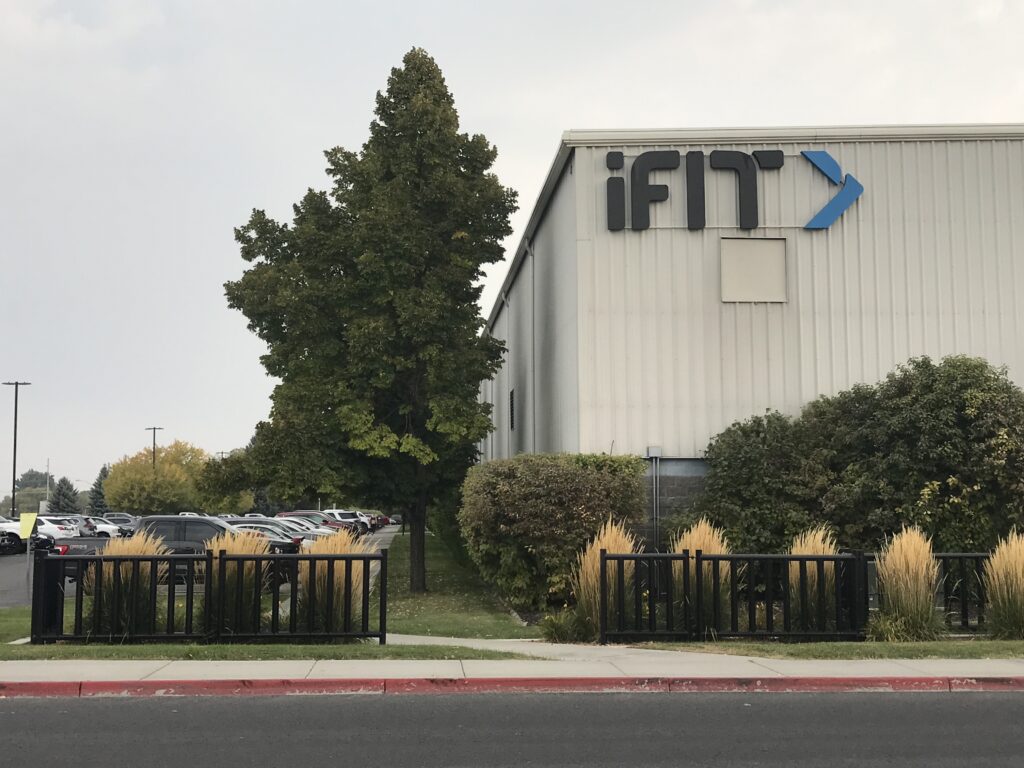iFIT corporate headquarters located at 1500 South 1000 West in Logan, Utah.
LOGAN – Cache Valley-based iFIT Health and Fitness (formerly ICON Health and Fitness), has undergone a restructuring at the highest level of management and received additional funding to settle debt and an outstanding lawsuit. After 45 years of service, co-founder, Chairman and CEO Scott Watterson is stepping down and will serve exclusively as Chairman of the Board of Directors. Watterson will be replaced by Steve Barr, Chief Financial Officer, and Mark Watterson, Chief Experience Officer, who will serve as co-presidents of the organization. Scott Watterson will work with the advanced development team to focus on product innovation.
“I am proud of what we have built at iFIT over four decades and our ability to successfully adapt in a rapidly evolving health and fitness landscape,” said Scott Watterson in a statement. “Today’s important updates strongly focus the business for continued growth in what has made us successful in the first place: technology, innovation, and the member experience.
“I look forward to lending my expertise in driving innovation as Chairman. I am personally investing alongside L Catterton, one of the world’s most successful health and wellness investors, in this capital raise. Moreover, I am excited to transition my executive responsibilities to Mark and Steve, who I am confident are well-suited to continue iFIT’s long history of success.”
Jointly, Barr and Watterson released a statement highlighting the company’s strong financial footing while also focusing on the future growth of the global brand.
“It has been a privilege to learn from Scott and we are excited about the next phase of iFIT’s journey,” said Mark Watterson and Steve Barr.
According to iFIT, L Catterton infused the company with $355 million of additional capital to “amicably (resolve) its outstanding litigation matter with one of its shareholders.” Company spokesperson Colleen Logan added that the funding is a mix of debt and equity.
Pamploma Capital Management invested $200 million into iFIT in December 2019. According to an article in the New York Post, Pamploma sued iFIT in January 2022 for $300 million (asking for the original $200 million investment plus $100 million in interest) over iFIT’s attempts to purchase a manufacturing partner in China – which Pamploma claimed violated its loan agreement. The additional funding from L Catterton prevents iFIT from facing bankruptcy while also allowing iFIT to preserve the vast majority of jobs throughout the organization.
iFIT had been preparing to become a publicly-traded company last fall but the initial public offering never took place. A few months later, the company laid off an undisclosed number of employees just weeks before Christmas.
“Being headquartered in Cache Valley, we appreciate the opportunity to provide jobs that facilitate greater health and wellness in our community and around the world,” Logan stated after the December layoffs. “A small reduction in workforce occurred to align with business needs as we continue to grow as a fitness technology company.
“We empathize with those impacted and appreciate their contributions to the company. Those affected were provided resources for moving forward, including instructions for transitioning 401K and health insurance, career advancement information and opportunity to apply for open positions within iFIT. Tenure-based severance was provided.”
The company underwent another round of layoffs late last week and earlier this week ahead of the additional capital investment. Logan states this week that the company’s global workforce needed to be reduced this go around due to several factors, including escalating costs and supply chain issues that have raised expenses for manufacturing and development.
The onset of the global pandemic caused an incredible surge in demand for home-based fitness and iFIT was at the forefront of that rising tide. In 2019, global revenue for the company was $700 million. That grew to $851 million in 2020 and ballooned to over $1.7 billion in fiscal year 2021.
“In order to safeguard the business over the long-term, we have made some difficult but important decisions regarding cost efficiencies,” Logan added this week. “We had to reduce our workforce throughout our global business. Although these actions are difficult, it will make iFIT stronger and leaner so we can invest substantially in our core brands, innovation and member development.”
iFIT provides fitness experiences and solutions to a growing community of over 7.3 million members in over 120 countries. iFIT’s industry-leading brands – NordicTrack®, ProForm®, Sweat®, Freemotion®, Weider® and 29029® – are powered by the iFIT integrated health and fitness platform, which seamlessly connects the company’s proprietary software, experiential content and interactive hardware.

